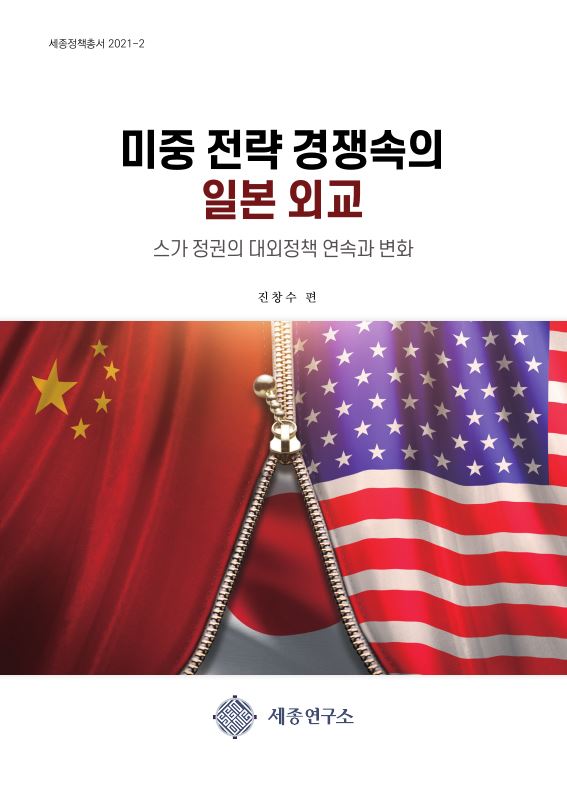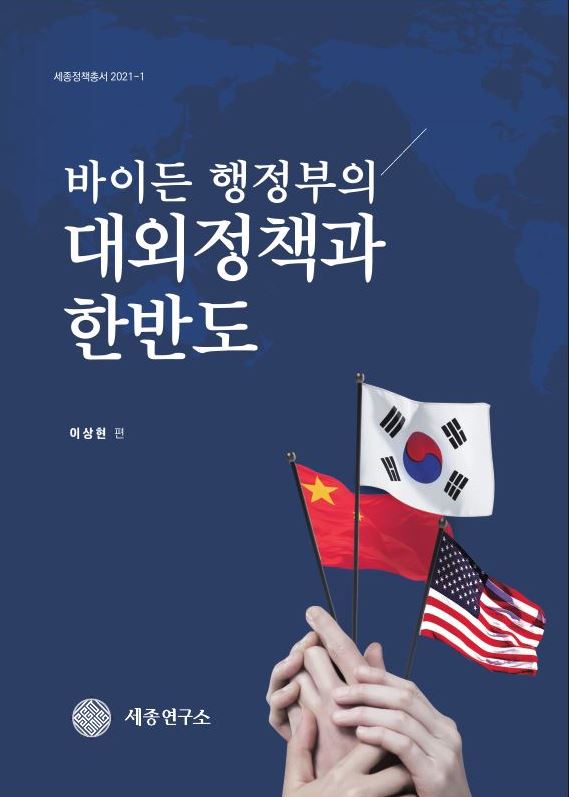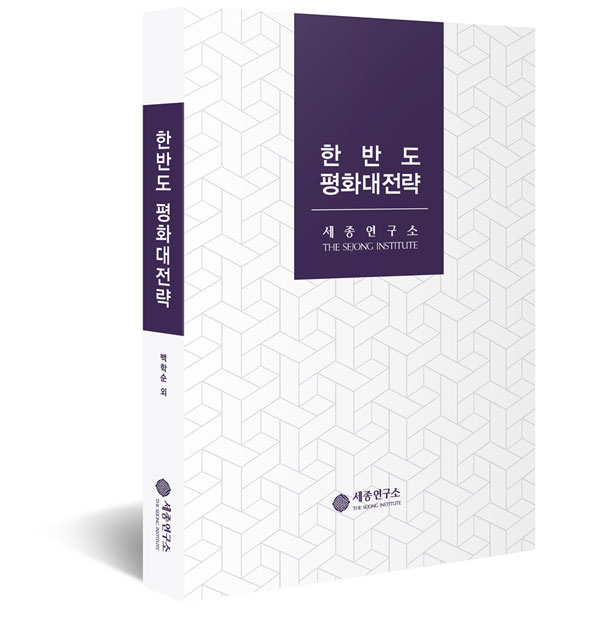|
The Sejong Institute is a Leading Think Tank in Foreign, Security and National Unification Affairs in Korea and Beyond.
|
|
SEJONG NEWSLETTER
|
Vol. 83 (March 2022)
Sejong Foundation www.sejong.org
|
|
|
|
 Sejong Book Series Sejong Book Series
 |
|
Japan's Diplomacy in Strategic Competition between the U.S. and China: Continuation and Change of Suga's Foreign Policy
This study examines the Suga administration's foreign policy and its impact on Korea-Japan relations. Japanese Prime Minister Yoshihide Suga was born after Abe resigned, the longest prime minister in Japanese constitutional history. Suga emphasized continuity with the Abe administration and maintained Abe's foreign and security policies. In other words, the core of Japan's diplomacy is the Japan-U.S. alliance for Prime Minister Suga. He said that it is important to move forward with Asian countries on the basis of the U.S.-Japan alliance. He is not particularly different from Prime Minister Abe. Japan’s Diplomacy in Strategic Competition between the U.S. and China: Continuation and Change of Suga’s Foreign Policy is only available in Korean.
|
 |
|
The Biden Administration’s Foreign Policy and the Korean Peninsula
The first year of the presidency of President Joe Biden, who took office on January 20, 2021, with international interests, passed. Contrary to the initial high expectations, the current state report for President Biden's first year is not very positive. Although Biden had declared that the U.S. is back, the U.S. does not seem to exist at the core of international politics. Due to the global status of the U.S., U.S. foreign policy has an international impact. The Biden Administration’s Foreign Policy and the Korean Peninsula is only available in Korean
|
 |
|
Korean Peninsula Grand Peace Strategy
The Sejong Institute judged that the "Korean Peninsula Peace Transition," which began in 2018, needed strategic guidance to establish a permanent peace system on the land so that war threats, especially nuclear war threats, would not recur again as we experienced in 2017. If we can break away from "hostility and war" that worsened over the past 76 years and achieve a major shift to "reconciliation and peace," the central value of our society will shift from "war" to "peace." Korean Peninsula Peace Grand Strategy is only available in Korean.
|
|
|
 March Institute Event Announcement March Institute Event Announcement
|
1. 13th Sejong Youth Academy Ceremony
1) Date and time: March 11 (Friday), 13:30 - 14:00
2) Location: Big Conference Room
|
|
2. Colloquia
1) 5th Colloquium
- Date and time: March 15 (Tuesday), 10:00 - 11:30
- Location: Small Conference Room
- Topic: Evaluation and Prospect of North Korea’s Missile Launch in 2022
- Presenter: Lee Sangmin Director of North Korean Military Research, Korea Institute for Defense
Analyses
- Host: Cheong Seong-Chang Director of the Center for North Korean Studies
2) 6th Colloquium
- Date and time: March 22 (Tuesday), 10:00 - 11:30
- Location: Small Conference Room
- Topic: Evaluation of the Taiwan Strait Crisis in the wake of the recent Ukraine crisis
- Presenter: Chung Jae-hung Research Fellow, Lee Dongmin Associate Professor, Dankuk University
- Host: Lee Daewoo Director of the Department of Security Strategy Studies
|
|
3. 3rd Sejong Cybersecurity Forum
Date and time: March 30 (Wednesday), 14:30 - 17:00
- Location: Somerset Palace Seoul
- Topic: Russia-Ukraine War: Role and Implications of Cyber Operations
|
|
|
 Publication Publication
National Strategy Vol. 28 No. 1 (Spring)
|
- Developing Plans for the Formation of a Korean Strategic Command | Kyeong Woon Jeong
- The Strategic Rivalry between the U.S. and China and a Prospects of Future War in the East Asia | Young-June Park
- US-China Competition during Trump-Xi Jinping Era: Limits of Economic Statecraft of Decoupling and the Rise of In-between Powers | Dae-yeob Yoon
- The Possibility of Termination of the Korea-Japan Continental Shelf Joint Development Agreement after 2028 and Chinese Variable: Challenging the Status Quo of the Institutionalized Cooperation | Chang-Gun Park and Sukjung Yoon
- War on Terror and Drone Strikes: A Case of Obama Administration’s Strategy in Pakistan | Won-June Hwang
- COVID-19 Stimulus and Political Supports: Presidential Approval and Government Trust | Jungsub Shin
- A Review of the Achievement and Disconnection of a Single Inter-Korean Team in 1991: Focused on the 41st Giba World Table Tennis Championships | Jin Hwan Choi
|
|
Current Issues and Policies
The Biden Administration's North Korean Policy: Disarray between the Reality and the Principle
Park Won Gon
Over the past year, the Biden administration's North Korean policy has been consistent with the Obama administration's "strategic patience." As the U.S. has not taken any active measures against North Korea, North Korea has been increasing, diversifying, and multiplying its nuclear capabilities while refusing to negotiate. The Biden administration's passive and static North Korean policy reflects the state of chaos in U.S. foreign policy as a a whole.
Strengthened Japan-U.S. Alliance and Japan's Security Capabilities: Focusing on the Discussion of Possessing "Enemy Base Attack Capabilities"
Lee Myon Woo
The change in Japan’s foreign and security policy dates back to the collapse of the Cold War. The Gulf War, which broke out at the time of the Cold War’s collapse, made Japan feel the need to strengthen its security capabilities, and since then, it has become possible to send self-defense forces overseas along with discussions on nationalization. The increase in threats from China and North Korea in the mid-1990s lso influenced Japan’s vicinity emergency law, military deployment, and development.
Indo-Pacific Trade-Security Environment Changes: from Free Trade to Supply Chain Competition
Choi Yoon Jung
With the Regional Comprehensive Economic Partnership (RCEP) taking effect, South Korea now enjoys free trade with partners representing 85% of world GDP. South Korea is a representative beneficiary of free trade. However, in the Indo-Pacific era of intensifying hegemony competition between the U.S. and China, trade is becoming more closely linked to security; it is clear that advanced economies are competing for an exclusive supply chain rather than free trade. The U.S.-led Indo-Pacific Economic Framework (IPEF) is a typical example.
Political Significance of the Beijing Olympics
Lee Dongmin
The Beijing 2022 Winter Olympics, which has attracted international attention since early February officially ended. The Olympics, which should be a cosmopolitan venue for reconciliation and celebration, have been harshly criticized due to various political interpretations and responses. However, some positive reviews have been made that the Olympics provided a meeting place and support when international exchanges have shrunk due to COVID-19. Through the Beijing Winter Olympics, the Chinese government hoped to achieve two major goals.
|
|
|
 Policy · Academic Events Policy · Academic Events
|
Third Colloquium of 2022
At the third colloquium held at the Sejong Institute on February 8 (Tuesday), Hong Wan Suk, a professor at Hankuk University of Foreign Studies, gave a presentation on the topic of "The U.S.-Russia Geopolitical Conflict Over Ukraine: Causes, Characteristics, and Implications". It was moderated by Lee Daewoo, director of the Department of Security Strategy Studies. The contents of the presentation and discussion will be published in the Sejong Policy Brief later.
Fourth Colloquium of 2022
At the fourth colloquium held at the Sejong Institute on February 22 (Tuesday), Jin Chang Soo, Senior Research Fellow, gave a presentation on the topic of “Japan’s Public Diplomacy Development Direction.” It was moderated by Choi Yoon Jung, Director of the Department of Diplomatic Strategy Studies. The contents of the presentation and discussion will be published in the Sejong Policy Brief later.
First Sejong Policy Forum of 2022
The Sejong Institute held its first Policy Forum on the topic of “Controversy and Implications of Ukraine” at the Somerset Palace located in Seoul on February 23 (Wednesday). The forum began with the opening speech of President Lee Sang Hyun of the Sejong Institute.
3rd Sejong Defense Forum
Sejong Institute held the 3rd Sejong Defense Forum on February 23 (Wednesday) from 10:00 to 12:00 at the seminar room of Somerset Palace Hotel Seoul with the theme of "reexamination of the pre-emptive strike and THAAD controversy and North Korea's nuclear response strategy". This forum was held under the leadership of Kim Heung-gyu Ajou University Professor, Kim Jungsup vice president of the Sejong Institute, and Shin Bum-Cheol Research Institute for Economy and Society.
|
|
 Column/Interview Column/Interview
|
|
|
|
|
|
THE SEJONG INSTITUTE, DAEWANGPANGYO-RO 851 BEON-GIL, 20, SUJEONG-GU, SEONGNAM-SI, GYEONGGI-DO, REPUBLIC OF KOREA
|
IF YOU NO LONGER WISH TO SUBSCRIBE TO OUR EMAIL NEWSLETTER, PLEASE SEND US AN EMAIL
|
|
tel. 031-750-7500 |fax. 031-754-0100
|
WEBSITE : https://www.sejong.org
|
|
Copyrightⓒthe sejong institute all rights reserved
|
EMAIL : jskim@sejong.org
|
|
|
|
|